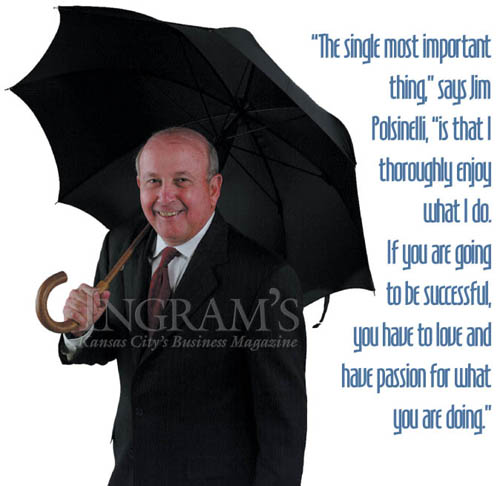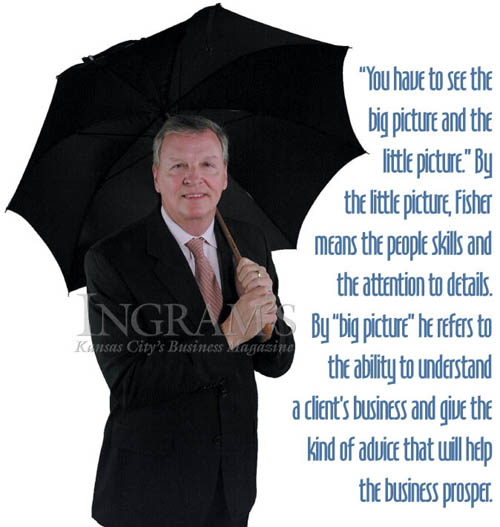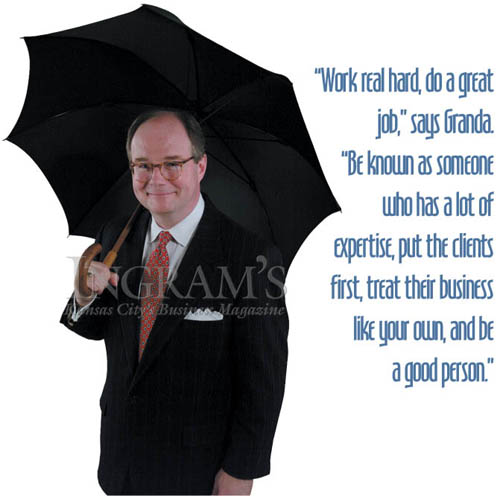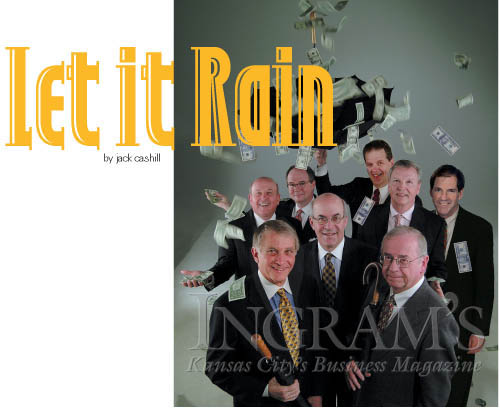|
A quick Internet search of the word “rainmaking”
reveals the two most likely points of references: one, of course, is lawyers;
the second is witches. And yet to talk to Kansas City’s leading legal
rainmakers, one gets no sense of wizardry in anything they do. In fact,
they succeed by doing what everyone else does. It’s just that they
work at it harder and do it better.
Rainmaking is not something that our rainmakers learned in law school,
not something anyone learns in law school. Law professors rarely talk
about the subject and never grade for it, never measure one’s potential
to succeed at it. And yet—there is no skill more important to the
success of a contemporary law firm than making it rain.
The rain, of course, is revenue. The skies from which it pours are the
coffers of the client. The great majority of the attorneys profiled are
business lawyers. They get their payment in the form of fees, typically
from clients who are both willing and satisfied. Only one of the attorneys
profiled is a self-described “trial lawyer,” and some portion
of his revenue, one suspects, comes from clients who are unsatisfied and
unwilling.
Even under the rubric “business lawyer” there is a fair amount
of diversity. Dave Fenley, chairman of Blackwell Sanders Peper Martin,
specializes in real-estate development but attributes much of his success
to his CPA background. G. Robert Fisher, an equity partner at Sonnenschein,
Nath & Rosenthal, specializes in mergers and acquisitions and corporate
transactional matters. Peter Brown, a partner at Husch & Eppenberger,
is a business planner with a heavy emphasis on tax.
Herb Kohn, a member of the executive committee at Bryan Cave, specializes
in corporate, business, and banking law. John Granda, the chairman of
the Corporate Department at Stinson, Mag, & Fizzell, specializes in
financing transactions, mergers and acquisitions, and securities-law compliance.
Harvey Kaplan, who specializes in product liability, chairs the pharmaceutical
and medical device litigation division at Shook, Hardy & Bacon. Jim
Polsinelli, the chairman and founder of the company that bears his name,
Polsinelli, Shalton & Welte, specializes in mergers and acquisitions
and business-succession planning. This “trial lawyer” is Larry
Ward, chairman of the board of Shugart Thomson & Kilroy, and he was,
of course, much joshed by his colleagues for this distinction.
Success
When asked what it takes to be successful at this enterprise, rainmakers
never talk about sales or marketing strategies. They talk instead about
the law and their relationship to it. Although they differ in point of
emphasis, there is near consensus among those we polled—the ones
cited by their colleagues as the city’s main pump primers—on
the need for dedication to the law.
“I think there are a lot of young attorneys who think it comes by
luck,” says Herb Kohn of Bryan Cave. What it really takes, says Kohn,
is “a lot of hard work over a long period of time.” He adds,
“You have to be a good lawyer. Clients will see through a person
who asks for business but can’t perform.”
“The majority of clients that I have come from other clients,”
observes Peter Brown of Husch & Eppenberger. What attracts them, he
believes, “is doing a real good job and providing excellent service.”
By service Brown means more than just good legal representation. He means
“responsiveness, answering client inquiries, making sure that someone
gets back to them.”
“The single most important thing,” says Jim Polsinelli, “is
that I thoroughly enjoy what I do. If you are going to be successful,
you have to love and have passion for what you are doing.”
Harvey Kaplan of Shook Hardy was one of only two of the attorneys who
volunteered the need for networking and gaining exposure. But exposure
alone is meaningless. “First and foremost,” he notes, “you
have to have demonstrated your abilities as a top-flight lawyer.”
“I keep my head down and keep at it,” David Fenley of Blackwell
Sanders volunteered as to his strategy. But, like Kaplan, he stressed
the need of “getting out to meet people.” One of the reasons
Fenley moved back to Kansas City, Mo., from Lenexa was that it “was
easier to get involved” in a meaningful way in civic affairs.

You have to become a consummate professional,” comments Larry Ward
of Shugart Thomson. “You have to become the very best that you can
be at what you specialize in.” For Ward being the best was part of
his long-term strategy. “I overworked every case,” says Ward.
“I worried about every detail, every nuance.” If one is dedicated
to his work and performs it in a principled, attentive way, “The
word spreads.”
G. Robert Fisher of Sonnenschein adds a slightly different wrinkle. “You
have to see the big picture and the little picture.” By the little
picture, Fisher means the people skills and the attention to details.
By “big picture” he refers to the ability to understand a client’s
business and give the kind of advice that will help the business prosper.
For John Granda of Stinson Mag, the answer is simple and straightforward.
“Work real hard, do a great job,” says Granda. “Be known
as someone who has a lot of expertise, put the clients first, treat their
business like your own, and be a good person.”
Background
Granda attributes his philosophy to his family’s humble, hardworking
roots in the small town of McComb, Ill., where he learned his “Midwest
work ethic.” He received both his law degree and his MBA from the
safely Midwestern University of Iowa.
Granda came to Kansas City from New York City where he worked five years
for the SEC. He chose Kansas City largely because he always liked the
town and was looking for a saner place to spend his life than New York.
He had no real connections here, no one waiting to reward him with his
business. Granda has been with Stinson Mag since his arrival in 1980.
Dave Fenley, the youngest of the attorneys at 47, was also the only one
to grow up on a farm. Fenley went all the way through high school in the
rural northeast Kansas town of Troy, population 1,100. His parents, who
had not gone to college, insisted that he and his siblings did. And so
Fenley went off to Washburn in Topeka on a football scholarship and stayed
on to get his law degree. After a brief fling at accounting, Fenley, who
was also a CPA, joined Blackwell Sanders in 1980 and hasn’t looked
back.
Herb Kohn grew up about as far in spirit and security from Troy, Kan.,
and McComb, Ill., as a person could. Born in Amsterdam, he spent most
of the first seven years of his life in hiding from the Nazi holocaust
apparatus. When his family arrived in America, the nine-year old Kohn
could not speak more than a few words of English. The one useful contact
he made in the third grade here in Kansas City was classmate Bob Bernstein,
who would go on to launch Kansas City’s most successful ad agency
and who remains one of Kohn’s clients to this day. Kohn, who received
his law degree from the University of Michigan, has been with Bryan Cave
for 11 years. He calls it “the best move I ever made.”
If Kohn, Fenley and Granda do not share many superficials in the way of
background, certainly not in the first nine years of their lives, they
do share a certain humbleness of roots. They all do. In fact, there are
no Ivy Leaguers among the eight attorneys profiled. No one was handed
much more than good advice by their parents. None among them started their
careers with much in the way of deep pockets or important contacts. If
anything, the very lack of fancy degrees and influential friends seems
to have propelled them to succeed.
Larry Ward talks proudly of “the marvelous shanty Irish family”
in which he grew up in the snob-free environs of Kansas City, Kan. He
went to Bishop Ward High School (no relation) and got his law degree from
UMKC. An old-fashioned kind of guy, Ward went to work for Shugart Thomson
right out of law school and has been there ever since.
Jim Polsinelli grew up in the equally modest confines of Waldo. He went
to Rockhurst High School and the University of Missouri, graduated from
UMKC law in 1967 and started his own firm with three other fellows in
that same year. Today that firm has 135 attorneys, 280 employees and four
offices.
Harvey Kaplan traces his roots to Independence, Mo., before moving to
Kansas City where he graduated from Southwest High. He received his law
degree from the University of Missouri, Columbia. “Knowing lawyers
from around the state is a nice thing,” says Kaplan, “but my
practice would not survive as just a Kansas City practice.” Kaplan
joined Shook Hardy in 1970 and has been there since.
G. Robert Fisher, another Kansas City native, followed the Catholic route
through Rockhurst High, Notre Dame and Georgetown Law. He also received
a master’s in tax at Georgetown. Upon returning to Kansas City in
1968, he and a few other young guys got together and launched Smith Gill
Fisher and Butts. In 1995, the 100-attorney firm merged with Bryan Cave,
and in 1999 Fisher joined up with the Chicago-headquartered Sonnenschein.
Peter Brown arrived in Kansas City with a law degree from Washington University
in St. Louis in 1973. He also has a master’s in tax from UMKC and
has been with Husch since 1986. As a non-native, Brown has always appreciated
the business environment in Kansas City.
“This is a total entrepreneurial town,” says Brown. “People
don’t worry about where you’re from, but what you do.”
The success of the attorneys in question testifies to the fluidity of
professional life in Kansas City. So open is the arena in which these
attorneys have competed that they are rarely obliged to even think about
that very openness.

Marketing Strategies
Attorneys tend to be more instinctive in their marketing than most other
professionals, successful attorneys particularly so. This is due to the
fact that they are to a large degree marketing themselves, a process that
has become a part of who they are.
Says Herb Kohn, “You sell the firm by selling yourself, by being
yourself, by selling your reputation, by selling your partners’ expertise.”
“We are kind of what we are,” adds Peter Brown. “If that
works for the client, fine.” Still, Brown is quick to list Husch’s
virtues, which he sees as being its ability to handle multiple problems
with its large staff, its team approach, and its responsiveness. Like
Kohn, he sells “both himself and the firm.”
David Fenley does not concern himself with formal positioning strategies
because, as he says, “The business that I am in [real-estate development]
is fairly definable. You know who the players are. And they know you.”
Jim Polsinelli positions the business that bears his name as “as
a strong regional firm” with national practices in select areas.
Just as importantly perhaps is the way he positions the firm within the
Kansas City legal community as a place “where people who really want
to succeed have room to grow.” He is not reluctant to find a place
for “laterals,” attorneys from other firms who are capable of
generating business.
G. Robert Fisher has nearly the opposite challenge of Polsinelli. He needs
to convince local clients that Sonnenschein is a local firm even though
it has a Chicago provenance. The fact that the firm has 60 attorneys in
Kansas City helps a good deal, as does the involvement of these attorneys
in the community. The firm’s national presence helps with larger
clients.
“It would be nice to be above it all,” observes Harvey Kaplan,
“but today it is vitally important that law firms attract business.”
The most effective form of marketing, as he sees it, is “meeting
people, following up, advising people on developments within the law,
making friends.” Kaplan also recognizes the value of more traditional
forms of advertising as a “helpful, supplemental tool.”
John Granda stresses both to clients and to would-be attorneys the “win-win
environment” at Stinson Mag. He cites the firm’s emphasis on
good personal relations, the team environment, and a sense that there
is always “something bigger than your deal.”
Although as a trial lawyer, clients often ask specifically for his services,
Larry Ward believes that “the practice has changed dramatically.”
The selection process now tends more towards firms than individuals.
All of the attorneys, in fact, agreed that there are far more competitive
pitches than there ever used to be. Oddly, although the attorneys inevitably
referred to these as “beauty contests” or “dog-and-pony
shows,” they secretly like the challenge of it all. These are, after
all, the guys who win. Speaking for just about every one, Peter Brown
claimed, “We get way more than 50 percent.” Speaking for everyone
as well, Herb Kohn admitted, “If I ever quit getting excited about
new business opportunities, I will hang it up.”

Words of Wisdom
“We look for people with the capability to generate business,”
notes John Granda. All of the other attorneys concurred. But the truth
is that there is no test law firms give to determine who among their new
recruits will be a potential rainmaker. “Academic excellence is still
important,” adds Granda, “but we look for the total package.”
“You look for a spark,” comments Harvey Kaplan. “You look
for people who inspire confidence in you—bright, energetic people
who want to succeed.”
And what advice do our veteran rainmakers offer to their young wannabes.
“Be interested in your client’s business and recognize opportunities,”
says Herb Kohn. “Become a good lawyer.”
Says Peter Brown, “Work hard and stress quality and service and you
will do very well.” Notes Harvey Kaplan, “Demonstrate that you
are good. Get out in front of people and get exposure. Make personal connections.
Network.”
“Become the very best that you can be at what you specialize in,”
adds Larry Ward. “Do your work in a principled way, and be as attentive
to clients as you can be.”
Says G. Robert Fisher, “I would focus on the phrase ‘practice
law.’ Practice is different from studying or the government or the
courts. This is a business. Focus on your practice skills.”
“Two things,” observes Davis Henley, “Make sure you are
putting in the time to be excellent. Then drop your lines in the water
and get to know as many as people as you can as well as you can.”
Midwestern born and bred, John Granda cuts right to the chase, “You
have to get your hands dirty to do the job right.”
Return
to Table of Contents
|



